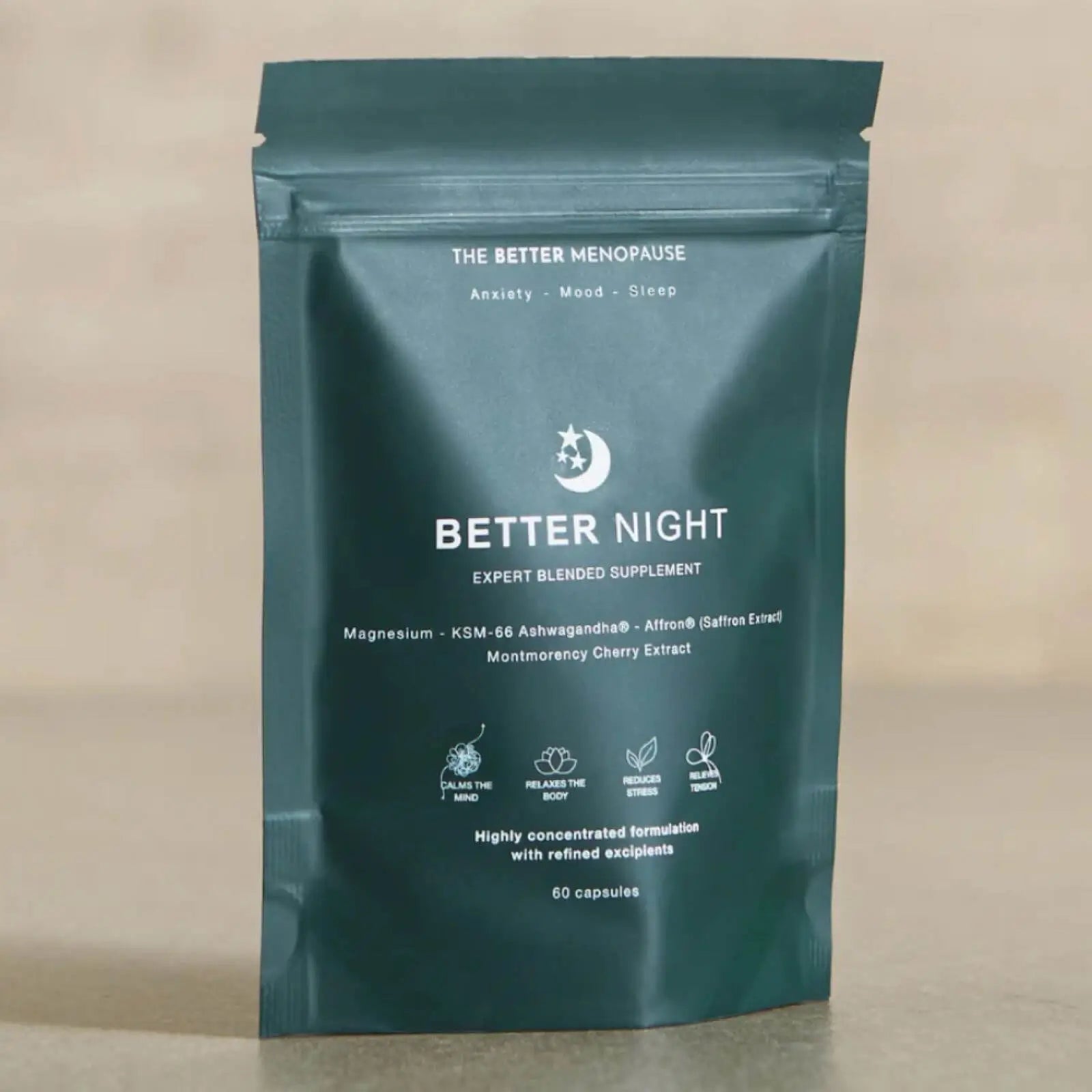
The menopause gut health connection and how to improve your digestive symptoms
Discover how changes to hormone levels, the gut microbiome and stress can impact your gut health – and what you can do about it.
Can menopause affect your gut health? The short answer is yes. Falling hormone levels are linked to disruptions in your gut microbiome, and this in turn can impact the health of your gut lining.
These changes can lead to a whole range of digestive issues, from constipation to diarrhoea, as well as contributing to other symptoms of perimenopause and menopause. Stress, which is closely associated with gut health, plays a role too.
The good news is, there are things you can do to significantly improve your gut health and menopause symptoms. Probiotic supplements can help to rebalance your gut microbiome and reduce gastrointestinal problems, while dietary changes, exercise and managing stress can also make a big difference.
The Better Gut probiotic supplements are specially designed to help with a wide range of menopause symptoms, including constipation, bloating and irritable bowel syndrome. For 10% off your first order, and regular expert tips on menopause health and nutrition, join our newsletter.
Hormones and the gut microbiome
Your gut microbiome is the community of bacteria and other microbes that live in your gut. By producing chemicals from the food you eat, and interacting with hormones, it can have an impact not just on your gut but all around your body.
A more diverse gut microbiome, with a wider range of different bacteria, is generally seen as a healthier one.
As you approach menopause, your levels of reproductive hormones such as oestrogen and progesterone decline. This is generally associated with changes to your gut microbiome.
These changes can include reduced diversity, as well as dysbiosis where your microbiome becomes unbalanced by too many unhealthy bacteria.
Research also suggests that low oestrogen and dysbiosis could lead to increased intestinal permeability – often known as ‘leaky gut’. Intestinal permeability is when the cells of your gut lining become less tightly packed, allowing potentially harmful chemicals and bacteria into your bloodstream.
The role of the estrobolome
Your estrobolome is made up of the bacteria in your gut microbiome that process oestrogen. They turn oestrogen that’s already been used back into an active form that can be redistributed around your body. There are groups of bacteria that do the same for other reproductive hormones, including progesterone.
In short, a healthier estrobolome means higher levels of circulating oestrogen and a less healthy one means lower levels. However, the relationship between your estrobolome and your hormones works in both directions.
While your estrobolome can boost your circulating oestrogen, it also needs oestrogen to thrive. That means that reduced oestrogen levels may disrupt your estrobolome. This can lead to fewer friendly bacteria in your gut to recycle the oestrogen you do have.
Menopause, stress and gut health
Changing levels of oestrogen during perimenopause and menopause can lead to higher levels of the stress hormone cortisol in your body. Cortisol also prompts the release of adrenalin, which can cause the kind of sudden anxiety associated with specific stressful events.
Most people will have first-hand experience of the effect stress can have on the digestive system, and studies involving menopausal women back this up, linking both higher cortisol levels and stress to diarrhoea and constipation.
This probably goes a long way to explaining why stress and anxiety are themselves such common symptoms of perimenopause and menopause.
Stress has also been linked to leaky gut, which could be another factor contributing to poorer gut health during menopause.
Gut health and menopause symptoms
During perimenopause or after menopause you may experience any of a range of gastrointestinal symptoms, including:
- constipation
- diarrhoea
- acid reflux and heartburn
- abdominal pain
- bloating
- excess gas
But your gut health doesn’t just affect your digestive system. The oestrogen and other reproductive hormones processed by your gut microbiome have functions all over your body.
That’s why dysbiosis, and its effect on your oestrogen levels, could also be involved in a range of other menopausal symptoms, from hot flashes to brain fog to vaginal health.
How probiotics can help with menopause gut health
Probiotics are live bacteria that can have health benefits, like the ‘friendly’ bacteria that are part of your gut microbiome. You can get them from supplements and from fermented foods.
Probiotics can help against dysbiosis by preventing ‘bad’ bacteria from colonising your gut and by improving the health of your gut barrier.
Consuming the right probiotics during perimenopause and menopause can help to rebalance your estrobolome, increasing strains of bacteria involved in processing oestrogen.
The Better Gut probiotic supplements include strains of gut bacteria associated with higher levels of oestrogen. All strains have been chosen for the impact they can have on a range of perimenopause and menopause symptoms, including gastrointestinal issues:
- irritable bowel syndrome (IBS)
- gut lining health
- bloating and constipation
- stress and anxiety
- hot flashes and night sweats
- brain fog and mental fatigue
- sleep quality
- vaginal health
- bone density and osteoporosis risk
- maintaining a healthy weight
Because these changes to your gut health can take time, we recommend using these probiotic supplements for at least three months before you start to assess the results.
Find out more here. And get 10% off your first order with the discount code WELCOME10.
Fermented foods
You can also find probiotics in live fermented foods and drinks, like yoghurt, kefir, aged cheeses, miso, kombucha, sauerkraut, kimchi and plenty of other fermented vegetables.
Although the bacteria in these foods won’t target menopause symptoms in the way that a specially designed probiotic supplement like The Better Gut does, they’re still great for your gut health and may help to boost the benefits of these supplements.
To maximise their effects, consume fermented foods every day and include as many different kinds as possible in your diet. This will provide you with a wide range of different probiotics and give them the best chance of setting up home in your gut.
Other ways to improve gut health during menopause
Here, we’ll look at some lifestyle changes that can make a real difference to the health of your gut microbiome, not to mention your all-round health.
Eat a wide variety of plants
Eating a wide range of plants is one of the best things you can do for your gut health during perimenopause and menopause – or at any time of life.
The fibre in plants improves digestion, while plant micronutrients called prebiotics act as food for your gut bacteria. Different plants contain different prebiotics and each prebiotic fuels different bacteria.
That’s why large-scale studies have shown that people who eat the greatest variety of different plants have the healthiest and most diverse gut microbiomes.
Your gut bacteria also use prebiotics to produce compounds called short-chain fatty acids (SCFAs). SCFAs are involved in crucial functions around your body, including reducing inflammation and regulating your immune system. One type of SCFA, butyrate, is particularly important in maintaining the health of your gut lining.
Examples of plants containing prebiotics include:
- artichokes
- asparagus
- berries
- chicory
- tomatoes
- garlic
- onions
- beans and pulses
- leafy green vegetables
- wholegrains, such as oats and barley
- nuts, including almonds
- seeds, like chia and flaxseeds
Many plants also contain compounds called phytoestrogens. These mimic some of the functions of oestrogen and have been shown to reduce menopausal symptoms including hot flashes.
Some of the best sources of phytoestrogens are legumes like beans and pulses, particularly soyabeans. They contain types of phytoestrogens called isoflavones.
Phytoestrogens are also found in a variety of fruits and vegetables, as well as whole grains, nuts, tea and even wine.
If you’re not used to fibre, adding too much to your diet in one go could make certain gut symptoms worse. Instead, introduce it gradually to let your gut get used to it.
Exercise regularly
Adding regular exercise to your routine is another lifestyle change that can have a hugely positive impact on your gut health.
Not only has it been shown to increase the diversity of your gut microbiome and tackle dysbiosis, it may also improve the ratio of certain species of bacteria that can help with gastrointestinal problems and the functioning of your gut barrier.
Manage stress
As we’ve seen, menopause, stress and gut problems are closely linked. These approaches to reducing stress may help:
- Exercise: Regular exercise is not just a great way to boost your gut microbiome, it can help to reduce the impact of stress too. Working out can also improve your mood, and give you a break from anxiety-inducing thoughts, or a chance to process them.
- Mindfulness: They may not be for everyone but mindfulness practices like meditation, yoga or deep breathing could reduce your levels of the stress hormone cortisol, as well as lowering your blood pressure.
- Talking: If you’re feeling stressed, simply sharing your thoughts can help. Talk to a friend or family member, or consider a talking therapy like cognitive behavioural therapy (CBT).
Antibiotics
If you have a bacterial infection, antibiotics can be crucial for tackling it. But they can also disrupt friendly bacteria, which can cause lasting changes to your gut microbiome.
Only take antibiotics when necessary and as directed by your doctor.
Don’t stop taking medicine you’ve been prescribed without talking to your doctor.
Smoking
Along with its many other negative effects on health, smoking tobacco can significantly reduce the diversity of your gut microbiome.
In fact, the microbiomes of smokers are similar to those of people with serious inflammatory bowel diseases (IBDs), and some researchers have suggested the two may be connected.
Can HRT improve gut health?
If you’re experiencing difficult menopause symptoms, your doctor may talk to you about hormone replacement therapy (HRT).
HRT uses tablets, skin patches or gels to replace the oestrogen and progesterone lost during perimenopause and menopause.
Although more research is needed, there’s some evidence that HRT can help to improve the health of your gut microbiome.
In one small study, menopausal women who took HRT had more ‘good’ bacteria and less ‘bad’ bacteria than those who did not. Overall, their gut microbiomes were much more like those of the premenopausal women in the study.
Summary
A complex combination of changes in your body chemistry can impact your gut health during perimenopause and menopause.
Reduced levels of oestrogen and other reproductive hormones can lead to an unbalanced and less diverse gut microbiome. Changes to your estrobolome – the group of gut bacteria responsible for processing oestrogen – can in turn affect your levels of circulating oestrogen.
Lower oestrogen levels also increase stress by prompting the release of cortisol and adrenaline. Stress itself is associated with gut dysbiosis and intestinal permeability, or leaky gut.
Together, these changes can lead to digestive symptoms including constipation, bloating, diarrhoea and heartburn.
Lifestyle changes that can help include regular exercise, stress management, stopping smoking and eating a wide variety of plants containing prebiotics and phytoestrogens.
Probiotic supplements, meanwhile, can improve digestive issues and a range of other perimenopause and menopause symptoms.
To boost your gut health, try The Better Gut probiotic supplements. And use the discount code WELCOME10 for 10% off your first order.



